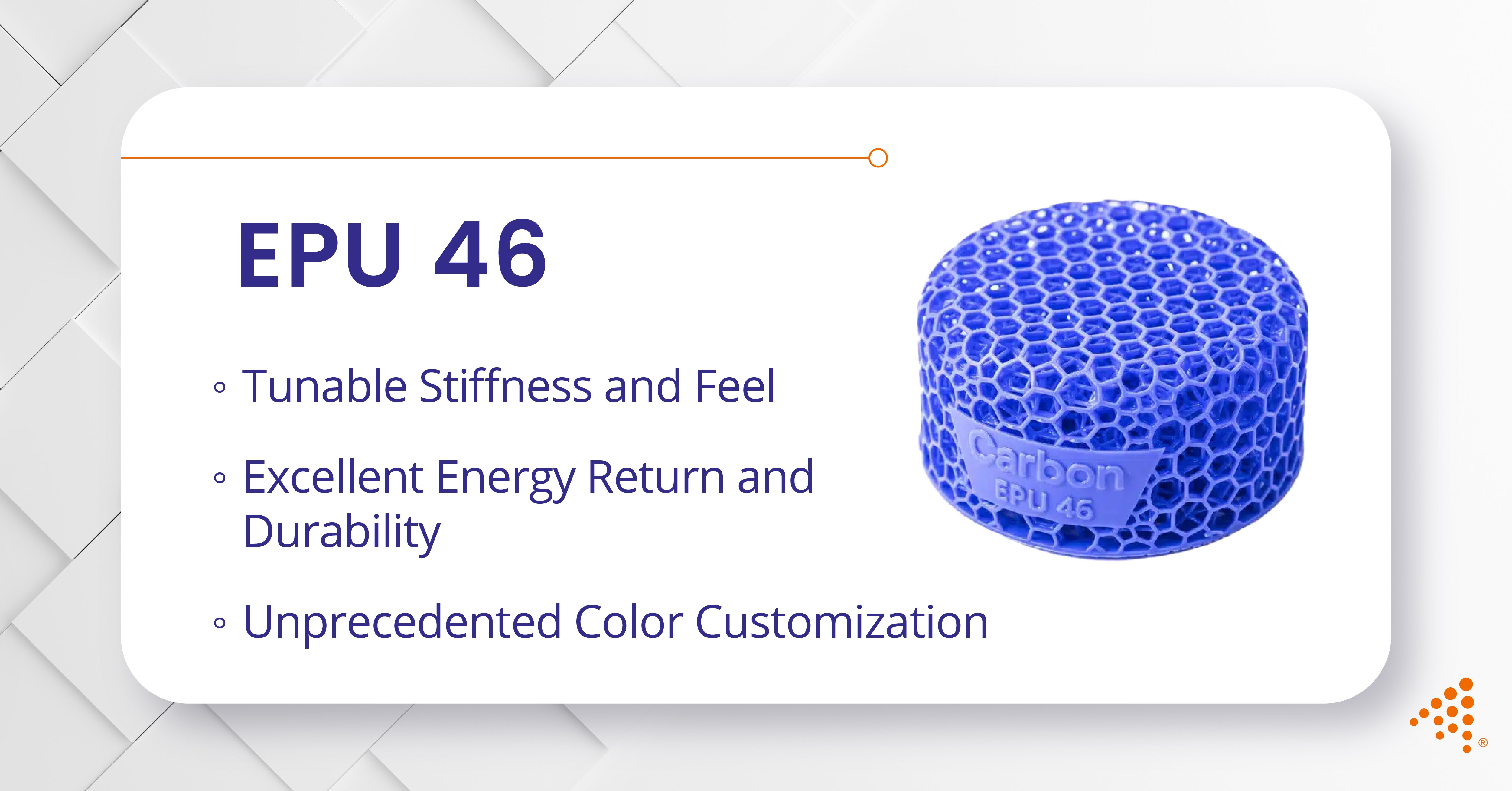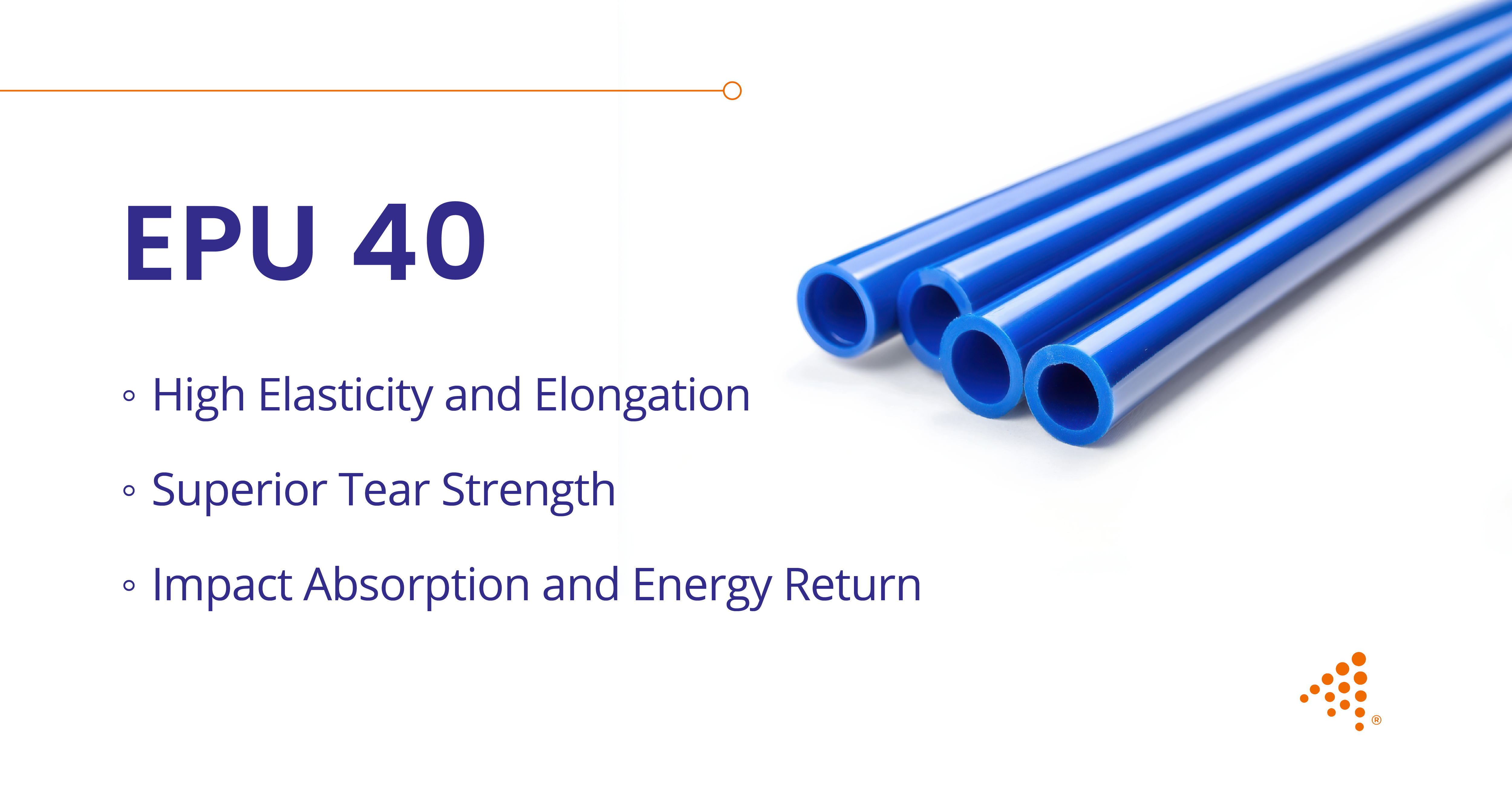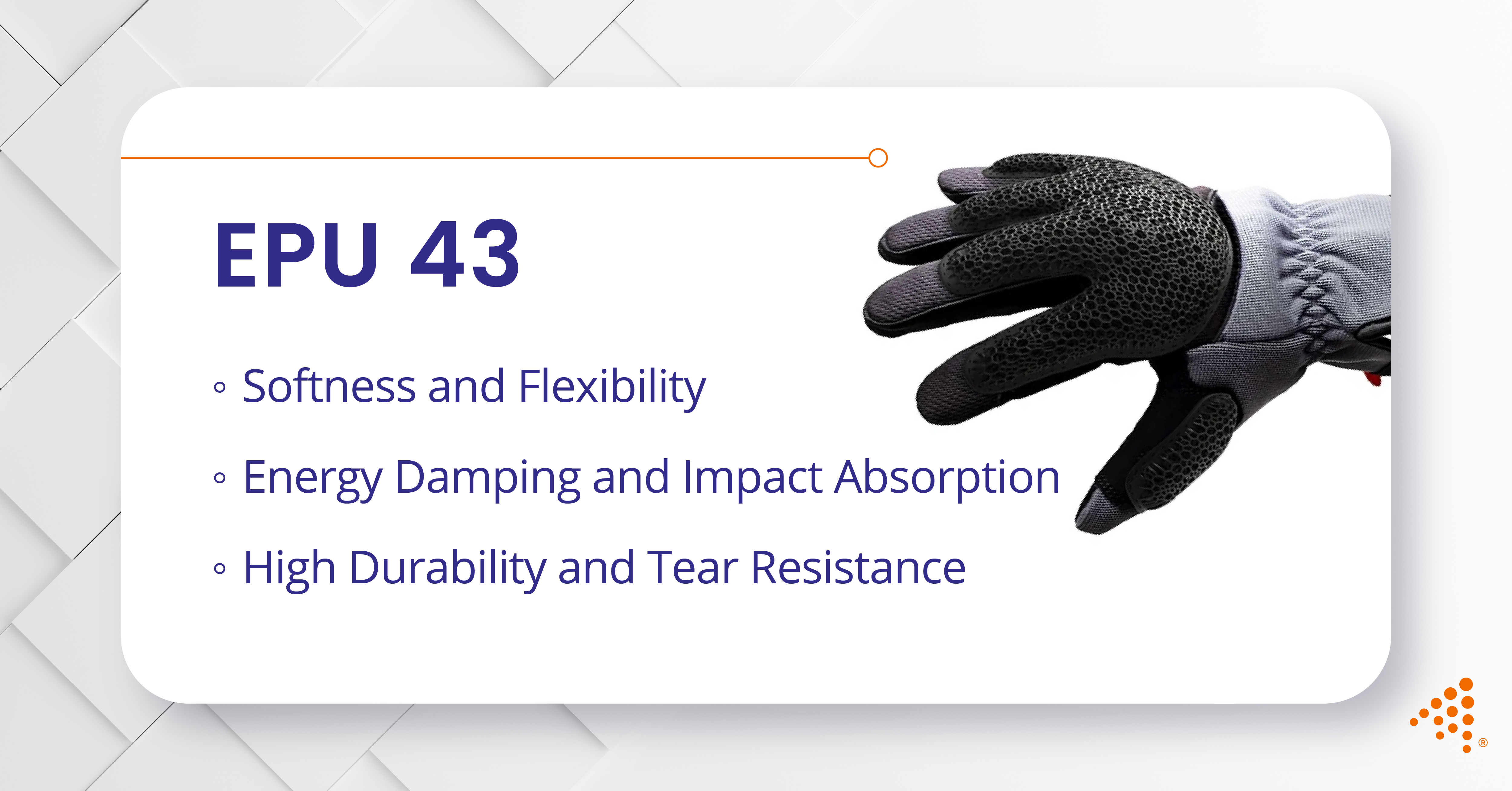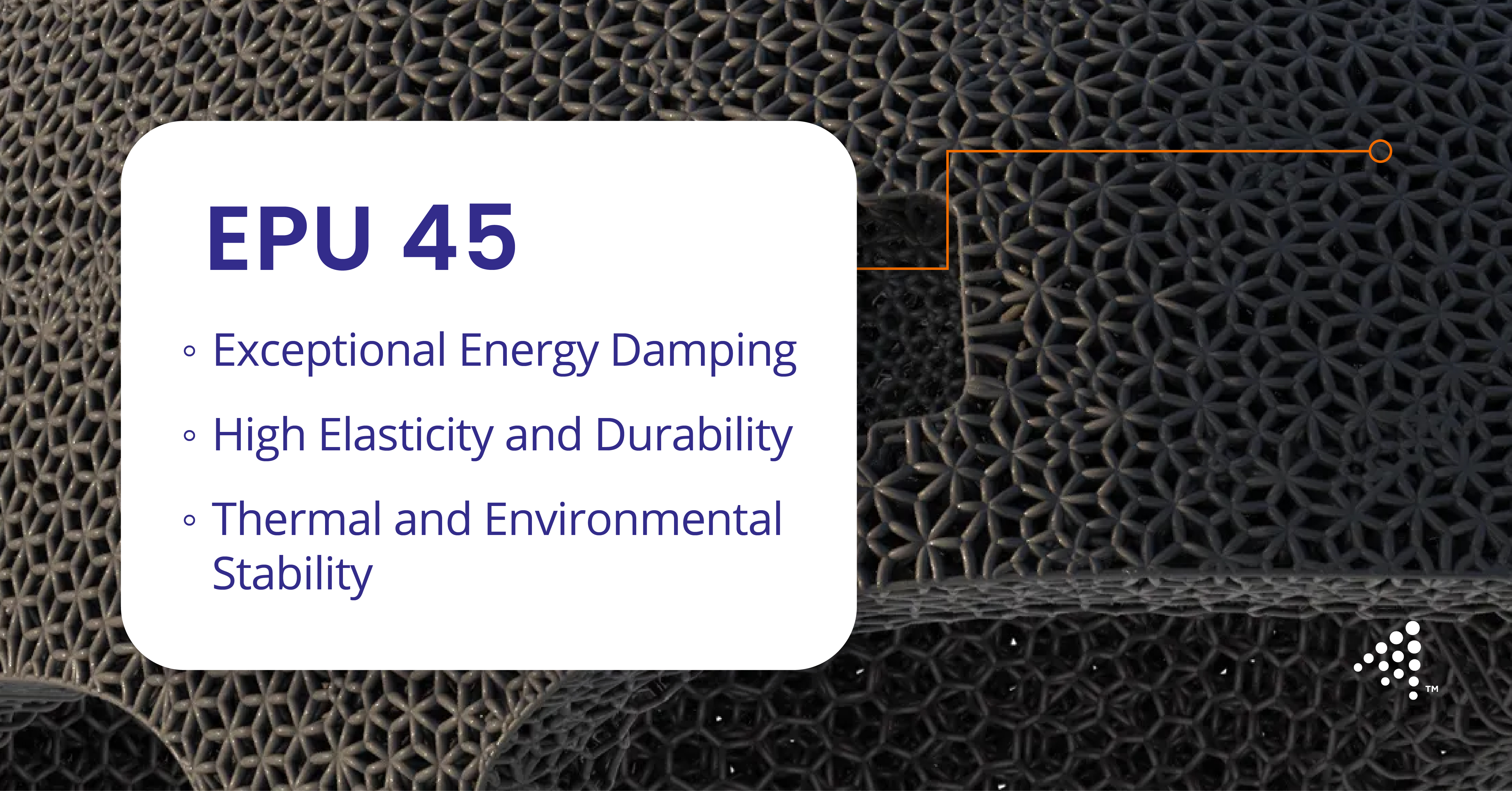EPU 40: Elastic, Tear-Resistant, Energy-Damping Resin
Elastomeric Polyurethane (EPU 40) is a high-performance additive manufacturing material developed by Carbon, renowned for its unique combination of...
4 min read
Nick Erickson : Aug 29, 2025 9:17:00 AM

Elastomeric Polyurethane (EPU) 46 is a versatile, high-performance elastomer from Carbon that stands out for its unique combination of durability, excellent energy return, and unprecedented customization. As a production-grade additive material, it is engineered to deliver reliable, isotropic performance in parts that demand both resilience and flexibility. EPU 46 is particularly well-suited for creating complex, lattice-like structures and end-use components that require properties similar to foam or traditional cast elastomers, making it a transformative option for industries ranging from consumer products to healthcare.
Read More About POM (Acetal/Delrin): Resin for Precision Components
One of the most significant features of EPU 46 is its tunable stiffness. By adjusting the blend ratio of its two-part resin system, manufacturers can modify the final part’s hardness from a firm Shore 78A down to a softer Shore 56A. This allows for precise control over the tactile feel and compressive response of the material, enabling a single resin platform to serve a multitude of needs, from firm, supportive structures to soft, pliable grips.
EPU 46 is engineered for applications that undergo repeated compression cycles. It exhibits a high degree of elasticity and resilience, with a Bayshore Resilience of 36%, allowing it to absorb impact and return to its original shape effectively. This material demonstrates impressive tear strength (44 kN/m) and an elongation at break of over 300%, ensuring parts can withstand significant stress and deformation without failing, making them suitable for long-term use in demanding environments. These features make it ideal for Medical Device Prototypes and other rapid prototyping services that require elastomeric functionality.
Unlike many engineering-grade materials, EPU 46 was designed with aesthetics in mind. It is available in a standard black base as well as a color base that can be pigmented to achieve a wide spectrum of custom colors, from translucent to fully opaque. This capability allows for brand-specific coloring and product differentiation without compromising the material’s mechanical properties—a key advantage for consumer-facing goods and plastic moulding services that require visual appeal along with durability.
For the medical device industry, material safety is essential. EPU 46 has been tested and meets the requirements for ISO 10993-5 (Cytotoxicity), ISO 10993-10 (Irritation and Skin Sensitization), and ISO 10993-23 (Intracutaneous Reactivity). Furthermore, it is formulated with 40% bio-based content, offering a more sustainable choice compared to entirely petroleum-derived materials. This focus on FDA-compliant manufacturing and renewability makes it an attractive material for skin-contacting devices and other medical injection molding applications.
The exceptional energy return and durability of EPU 46 make it ideal for performance footwear, particularly in midsole components where it can be latticed to provide tailored cushioning and support. It is also frequently used for bicycle saddles, grips, and protective padding. For product developers exploring Design for Additive Manufacturing (DfAM) and 3D printed prototypes, EPU 46 enables end-use parts that can’t be replicated with traditional methods.
Given its biocompatibility, EPU 46 is a strong candidate for various medical applications. It can be used to produce customized seals, gaskets, grippers for surgical tools, and patient-specific padding or cushioning. Its elastomeric properties are valuable for parts that require flexibility and repeated use, offering an alternative to traditional materials used in medical injection molding.
Beyond specialized fields, EPU 46 serves as a robust material for industrial and consumer goods. This includes vibration-dampening mounts, flexible connectors, protective bumpers, and ergonomic handles. The combination of toughness and customizable aesthetics makes it a versatile solution for design and manufacturing companies seeking advanced injection molding tooling alternatives or additive manufacturing solutions.
Read More About Key Red Flags to Watch for When Choosing an Injection Molder
The primary counterpart to EPU 46 in the world of injection molding is the broad family of Thermoplastic Polyurethane (TPU) elastomers. TPUs are valued for their toughness, abrasion resistance, and wide range of durometers, making them a staple in countless industries. Like EPU 46, TPUs offer excellent elasticity and tear strength. Both materials can produce durable, flexible parts suitable for footwear, seals, and soft-touch overmolds.
However, EPU 46 distinguishes itself through the Carbon DLS prototyping and additive manufacturing services it enables. While injection molding with TPU is highly efficient for mass-producing identical parts, it requires expensive and time-consuming tooling, making customization or low-volume runs impractical. EPU 46, used with Carbon’s Digital Light Synthesis™ (DLS™) technology, allows for the creation of highly complex geometries, such as intricate lattices, that are impossible to mold as a single piece. This allows for performance characteristics, like directional compression, that are tuned by design rather than just material choice. Additionally, plastic injection molding companies cannot match the on-demand color and stiffness variations that EPU 46 offers.
Read More About DFM in Injection Molding: Cut Costs, Improve Quality
While robust at room temperature, EPU 46 has a relatively low heat deflection temperature of 122°F (50°C) at 0.455 MPa. Its glass transition temperature (Tg), where the material begins to lose its rubbery properties, is also low at approximately 21°F (-6°C). This makes it unsuitable for components requiring high-temperature sterilization or ISO 13485 injection molding conditions such as autoclaving.
EPU 46 offers good resistance to many common substances, including water, alcohols, and household cleaners. However, like many polyurethanes, it can be susceptible to degradation from prolonged exposure to certain oils, fuels, strong acids, and organic solvents. For any application involving aggressive chemical contact, thorough testing is necessary to validate its long-term stability.
For producing millions of simple, identical parts, traditional injection molding remains the more cost-effective method due to its incredibly fast cycle times and low per-part material cost. While the Carbon DLS process is one of the fastest additive technologies available, the per-part cost and production speed may not be competitive for extremely high-volume applications where the geometric complexity or customization enabled by EPU 46 does not add significant value.
Choosing EPU 46 is a decision to prioritize performance, customization, and design freedom. It is the ideal material when you need to move beyond the constraints of traditional molding to create parts with intricate, performance-enhancing geometries. Its unique combination of tunable stiffness, high energy return, and durability allows for the production of superior elastomeric components—from advanced athletic gear to ISO-certified manufacturing for biocompatible medical devices. The added benefits of custom coloring and a more sustainable, bio-based formulation make EPU 46 a forward-thinking choice for design for manufacturing services and digital manufacturing solutions that aim to elevate both function and experience.
At Aprios, we can help you choose the right material for your specific needs. Get in touch for expert advice and solutions tailored to your project!
You can also view our Material Selection tool.

Elastomeric Polyurethane (EPU 40) is a high-performance additive manufacturing material developed by Carbon, renowned for its unique combination of...

Elastomeric Polyurethane (EPU) 43 is a high-performance, energy-damping elastomer developed by Carbon for its Digital Light Synthesis™ (DLS™)...

Elastomeric Polyurethane (EPU) 45 is a high-performance photopolymer resin engineered for the Carbon Digital Light Synthesis™ (DLS™) process. This...